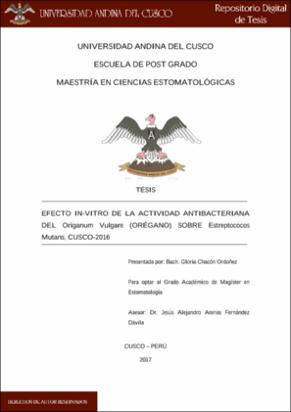| dc.contributor.advisor | Arenas Fernández Dávila, Jesús Alejandro | |
| dc.contributor.author | Chacón Ordoñez, Gloria | |
| dc.date.accessioned | 2018-08-09T19:30:45Z | |
| dc.date.available | 2018-08-09T19:30:45Z | |
| dc.date.issued | 2017-12-16 | |
| dc.identifier.uri | https://hdl.handle.net/20.500.12557/1783 | |
| dc.description.abstract | El objetivo de la presente investigación fue determinar el efecto antibacteriano in vitro del aceite esencial de: Origanum Vulgare (Orégano), mediante el método de difusión en agar con disco, sobre Estreptococos Mutans ATCC 25175. El aceite esencial de dicha planta se obtuvo por el método de arrastre por vapor de agua. Para realizar el análisis microbiológico, se utilizó el aceite esencial de Orégano al 50%, 75% y 100%, éstas se diluyeron con el Tween de 80, fueron comparados con Gluconato de Clorhexidina al 0.12% como control positivo y como control negativo se utilizó: Tween de 80. El estudio corresponde a un enfoque cuantittivo, cuyo diseño es experimental. Del análisis de varianza al 95% de confianza se acepta la hipótesis alterna (Valor-P<0.05), con lo que se puede concluir que el aceite del OriganumVulgare (orégano) presenta actividad antibacteriana sobre Estreptococo Mutans. Se realizó la prueba de Tukey, que comparó cada uno de los promedios de los halo de inhibición encontrándose que el aceite de Orégano al 50% y control tienen resultados similares y no presentan efecto antibacteriano; en cambio el aceite de orégano al 75% presenta efecto antibacteriana y su longitud promedio de halo de inhibición es de 10.6825 inferior estadísticamente en 11.1425 del Clorhexidina 0.12% que es de 21.825. Por otra parte se observa claramente que los resultados de la longitud de los halos de inhibición de aceite
de orégano al 100% y del medicamento comercial Clorhexidina 0.12% son estadísticamente diferentes, observándose que el Aceite de Orégano al 100% presenta efecto antibacteriana y es superior al de Clorhexidina 0.12% en 4.875. | es_PE |
| dc.description.abstract | The objective of the present investigation was to determine the in vitro antibacterial effect of the essential oil of: Origanum Vulgare (Oregano), by means of disc diffusion method, on Streptococcus Mutans ATCC 25175. The essential oil of said plant was obtained by the water vapor entrainment method. To perform the microbiological analysis, the essential oil of Oregano was used at 50%, 75% and 100%, these were diluted with Tween of 80, were compared with 0.12% Chlorhexidine Gluconate as a positive control and as a negative control was used : Tween of 80. The study corresponds to a quantitative approach, whose design is experimental. From the analysis
of variance to 95% confidence, the alternative hypothesis is accepted (P-value <0.05), with which it can be concluded that Origanum Vulgare oil (oregano) has antibacterial activity on Streptococcus Mutans. The Tukey test was performed, which compared each
of the averages of inhibition halo found that 50% Oregano Oil and Control have similar results and have no antibacterial effect; On the other hand, 75% oregano oil has an antibacterial effect and its average inhibition halo length is 10.6825 statistically lower in
11.1425 of 0.12% Chlorhexidine, which is 21,825. On the other hand it is clearly observed that the results of the length of the haloes of inhibition of 100% Oregano Oil and of the commercial medicine Chlorhexidine 0.12% are statistically different, observing that 100% Oregano Oil has an antibacterial effect and is superior to that of Chlorhexidine 0.12% in 4.875. | en_US |
| dc.description.uri | Tesis | es_PE |
| dc.format | application/pdf | es_PE |
| dc.language.iso | spa | es_PE |
| dc.publisher | Universidad Andina del Cusco | es_PE |
| dc.rights | info:eu-repo/semantics/restrictedAccess | es_PE |
| dc.source | Universidad Andina del Cusco | es_PE |
| dc.source | Repositorio Institucional - UAC | es_PE |
| dc.subject | Aceite esencial | es_PE |
| dc.subject | Origanum vulgare | es_PE |
| dc.subject | Efecto antibacteriano | es_PE |
| dc.subject | Estreptococos mutans | es_PE |
| dc.title | Efecto in-vitro de la actividad antibacteriana del Origanum Vulgare (orégano) sobre Estreptococos Mutans, Cusco-2016. | es_PE |
| dc.type | info:eu-repo/semantics/masterThesis | es_PE |
| thesis.degree.name | Maestro en Ciencias Estomatológicas | es_PE |
| thesis.degree.grantor | Universidad Andina del Cusco. Escuela de Pos Grado | es_PE |
| thesis.degree.level | Maestria | es_PE |
| thesis.degree.discipline | Ciencias estomatológicas | es_PE |

